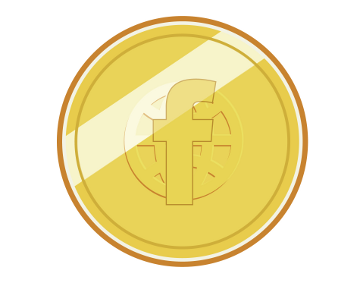Facebook Credits are becoming increasingly popular.

Now many large services get their own currency. Someone calls such a currency "votes", someone - loans. Facebook introduced its own currency back in 2009, and then many experts believed that all this was for nothing, that no one else needed another internal payment system. But in reality, Facebook Credits have become quite popular, and most importantly - this resource has begun to bring good social network profits.
In this special promotion for Facebook Credits social network did not. Somehow several tips were published on using this currency for internal services (including games), and that’s all. Nevertheless, Facebook Credits brought the company 557 million dollars in 2011 - this is 15% of Facebook's total income for 2011. At the same time, virtual goods for this “currency” are bought by only 2% of social network users. And the main direction of shopping is social games, i.e. all sorts of products for these games. Agree, quite well - only 2% of users provide 15% of the company's revenue.
')
Why doesn't Facebook advertise its currency more aggressively? There are several theories about this. Proponents of the first theory believe that the company is waiting for an IPO, and after that it will actively advertise its “currency”. As for the second theory, its adherents believe that the company lets some of its services “float free,” allowing it to develop slowly but surely. And after the complete running-in of a new service, the company begins to work with it more actively. For example, the App Platform was opened only in 2007, and gradually began to gain popularity (millions of users play games). And only a few years later, in July 2011, the social network began to actively monetize this platform.
Experts believe that now Facebook Credits are almost ready for active promotion, and the company will soon deal more closely with its currency. There is a high probability that after the IPO, Facebook Credits revenue will double every year, and by 2016, Facebook Credits will dominate revenue over advertising revenue.
Via techcrunch
Source: https://habr.com/ru/post/144088/
All Articles